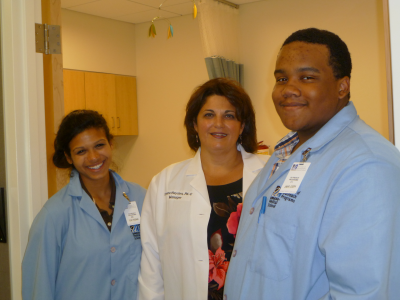|
Among those who received degrees at UMass Medical School’s 39th Commencement exercises this past June were six individuals—nearly 5 percent of this year’s medical and biomedical sciences graduates—who had studied here years before they entered doctoral programs. While still in college or high school, they participated in one or more UMMS summer outreach program for students from backgrounds that are underrepresented in medicine, or who are economically or educationally disadvantaged. That these students went on to become physicians and research scientists may be proof that programs designed to bring underrepresented and underserved individuals into the health care workforce pipeline are working. The Office of Outreach Programs again hosted three diverse groups of young people this summer, all of who shared the common goal of learning more about what it takes to become a physician, research scientist, or other health care or biomedical science professional. This is the first in a three-part series highlighting the experiences of some of the students and educators who participated this summer in these potentially life-changing programs. We begin with the youngest students, members of the High School Health Careers Program’s own Class of 2011. |
|
2011 High School Health Careers Program participants Tove Freeman (left) and Jamar Johnson enjoyed clinical internships in outpatient orthopedics. They are pictured here with clinic manager and internship host Donna Hayden. |
The members of the 2011 High School Health Careers Program were just kids with a dream when they arrived at UMass Medical School on a Sunday afternoon in June. Four weeks later they were kids with a dream and a plan, with sharper skills and clearer focus. During their time here, 15 teenagers from across Massachusetts learned what it will take to turn their dream of a health care career into reality, and gained essential skills and knowledge to use on the journey ahead.
With its goal to increase the numbers of individuals from under-represented and disadvantaged backgrounds in health care and science careers, the HSHCP exposes high school students to careers in medicine, biomedical sciences and biotechnology at an early stage in their academic development, encourages them to set high academic goals and assists them in developing strategies to achieve them.
The program deploys a variety of teaching methods in various environments, including classroom academics, seminars in contemporary and cultural health issues, field trips and hands-on internships. Perhaps most important, this group of likeminded students have the opportunity to interact with health care faculty and providers in a professional setting on a day-to-day basis so that they can begin to envision themselves in the same milieu.
“I have really enjoyed making good friends who are motivated like I am and who work hard,” said Tove Freeman, a rising senior at Quabbin Regional High School in Barre. She and Jamar Johnson, a rising senior at Southeastern Vocational Technical Regional High School in South Easton, are two of the 15 students—from more than 700 applicants from all across the state—who were admitted to the program. Both interned in the outpatient orthopedics department at UMass Memorial Medical Center. “They show us everything that you could possibly do in medicine in this program,” said Johnson. “They throw everything at you. The exposure is great.”
With plans to become physicians, both found the seminar on medical school admissions eye-opening. “It really broke down all the things that students who go to medical school have done during college,” Johnson added. “From beginning to end, everything has to be down to a T.”
“It’s good to know that, if we want that option in the future, we need to start thinking about it now,” said Freeman. “It’s a long process, but we’ll get there. From this experience I have realized that I would like to go to medical school, and I am fully capable of fulfilling that dream.”
HSHCP students are housed in dormitories at Worcester State University to get an early taste of college life. Their non-stop educational, enrichment and social activities culminate in research presentations at the closing ceremonies, where, in front of proud family members, the students receive certificates of completion and awards for exceptional performance.
“It has long been documented that students from backgrounds that are underrepresented in health care or who are economically or educationally disadvantaged aren’t adequately prepared for a science profession,” said Deborah Harmon Hines, PhD, vice provost for School Services and professor of cell biology, who directs the Office of Outreach Programs. “Our high school health and other outreach programs demonstrate UMass Medical School’s long-term commitment to bringing diversity to the health care and biomedical sciences work force.”
View the slideshow to glimpse a day in the life of a UMass Medical School High School Health Careers Program participant.
Learn more about the Summer Undergraduate Research Fellowship Program in the full series:
-
Summer programs, part 3: Realizing the rewards of research
-
Summer programs, part 2: Making the leap from college to medical school
